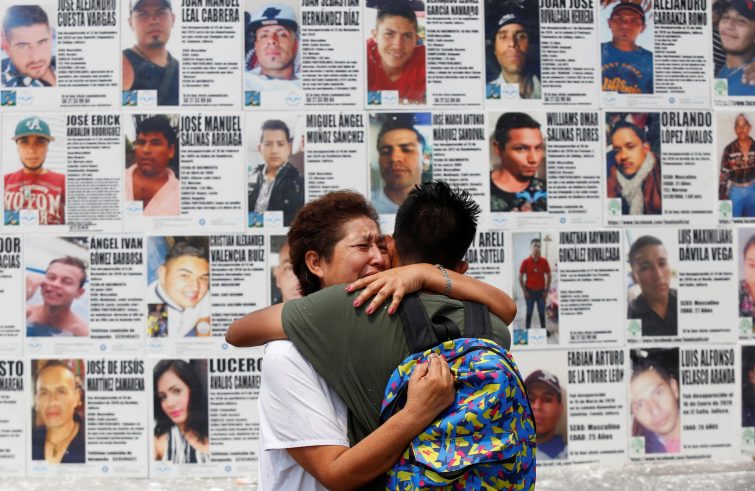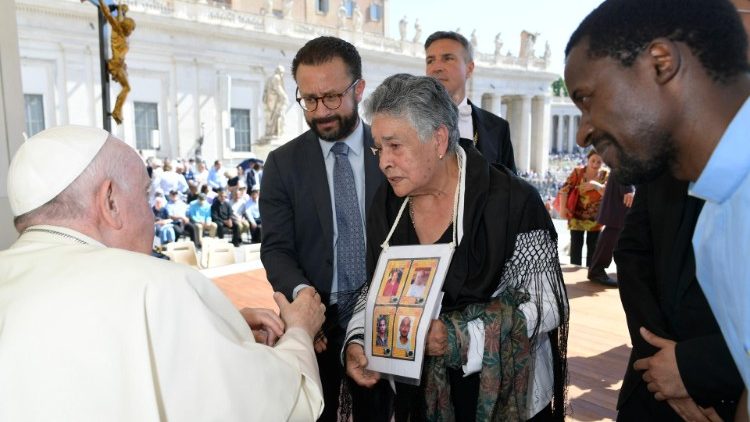
‘We are the victims, but it is precisely because of this situation that we must become builders of peace.” María Herrera Magdaleno keeps repeating this phrase. She repeated it emotionally to Pope Francis in the Vatican about two months ago, while he caressed the photographs of her four desaparecidos children. She repeats it today, on the eve of a Day of Prayer to be held in parishes throughout Mexico on Sunday July 24, when family members of killed or missing persons will bring pictures of them into the churches. We must look ahead, she explains, and strive to become, in every way, “builders of peace.” That is the only way to overcome the spiral of violence gripping the country. Even if it comes at a cost. Even though at every hour of the day, every minute of her existence, her thoughts go to her children Jesús Salvador, Raúl, Gustavo and Luis Armando, whom she has been searching for for years, digging with shovel and pickaxe, along with other mothers who went through her same tragic experience. She is sustained by her simple and deep-rooted religiousness
 Unprecedented Church mobilisation. María is a ‘testimonial’ of the initiative taken by the Mexican Church this July, organised by the Mexican Episcopal Conference (CEM), the Conference of Major Superiors of the Religious of Mexico ( CIRM) and the Mexican province of the Society of Jesus. The unprecedented prayer and mobilisation effort aims to raise awareness among the faithful and all of society of the persons killed and those who are missing.
Unprecedented Church mobilisation. María is a ‘testimonial’ of the initiative taken by the Mexican Church this July, organised by the Mexican Episcopal Conference (CEM), the Conference of Major Superiors of the Religious of Mexico ( CIRM) and the Mexican province of the Society of Jesus. The unprecedented prayer and mobilisation effort aims to raise awareness among the faithful and all of society of the persons killed and those who are missing.
Organised crime kills almost 35,000 people every year nationwide. According to the official data from the State of Mexico, more than 100,000 people are missing with no news of their whereabouts, with an estimated 52,000 unidentified bodies lying in clandestine graves. Over the past few days, faced with President Andrés López Obrador’s polemical question (“Why does the Church only raise its voice now?”), CEM replied by publishing a list of all appeals for peace and against violence and crime released by the Mexican Church since 1968. However, never before had there been such an organised and wide-ranging effort.
The decision came in response to a new surge in violence against priests, culminating in the heinous murder of Jesuit priests Javier Campos and Joaquín Mora in church a month ago, in northern Chihuahua State. A national day of prayer against violence and for peace was observed on July 10, in memory of the slain priests, men and women religious, and pastoral workers. Walks, prayer vigils and other initiatives were held locally.
“We ask you to bring to church, on Sunday July 24, photographs of friends or relatives whose lives were taken by violence or who are desaparecidos”, wrote the promoters. “We invite all priests to say a special prayer for them, calling for truth and justice, and consolation for their relatives, in a gesture of recognition and remembrance of Christ’s affliction in our country. We ask that Sunday 31 July, the feast of St Ignatius of Loyola, be a day of prayer for the repentance of the executioners, and for the fulfilment of what Pope Francis refers to as “a better kind of politics”, in Chapter 5 of his encyclical Fratelli Tutti, centred on encounter, dialogue, consensus and recovery of the community.” A large umbrella group of church and civil society organisations also adhered to Sunday’s event. María echoed the appeal: “It’s important. Bring the photographs to the churches. Over the years, as mothers and relatives of missing persons, we experienced the absence of government institutions. We are grateful to the Church, to the episcopate, for the closeness shown towards us. This gratitude extends, in fact, to the Churches, since this battle is taking on an ecumenical dimension.”
A network of 168 organisations. Until 15 years ago, Mrs Herrera was unaware of the phenomenon of the desaparecidos. “Any person and any family can find themselves immersed in this dramatic situation overnight,” she says. In 2008, Jesús Salvador (24) and Raúl (19) disappeared into thin air from one day to the next in Guerrero State, along with five other co-workers engaged in the business of purchasing and selling precious metals. In 2010, Gustavo (28 years) and Luis Armando (24), together with two cousins, went missing in Veracruz State. Other children (eight in all) have also risked a similar fate over the past few years.
María, who is moved as she talks about them, set out to search for her children, met with other mothers, some of them would even go out with a shovel and pickaxe whenever there were reports of clandestine graves.
She thus founded the organisation ‘Familiares en búsqueda María Herrera’ (‘Families in search’). And her efforts did not end there. “We also created a network of existing organisations. There are now 168 interlinked organisations in 26 Mexican States.” As mentioned, research is carried out through excavation activities, but also by monitoring cemeteries, hospitals, rehabilitation centres and shelters for the homeless. “This commitment has been given impetus thanks to the partnership with the churches. We have little faith in human justice, but we certainly have faith in Divine justice.” The meeting with the Pope occurred in the framework of Mrs Herrera’s commitment: “He embraced me, he listened attentively, I could feel his participation and that he was moved. He blessed the photographs of my children, assured me of his prayers for all the missing persons, and told me that he follows the situation in Mexico with special attention and concern. However, in the face of so much suffering, I do believe that these weeks we are experiencing through this campaign and this prayer are a time of grace.”











